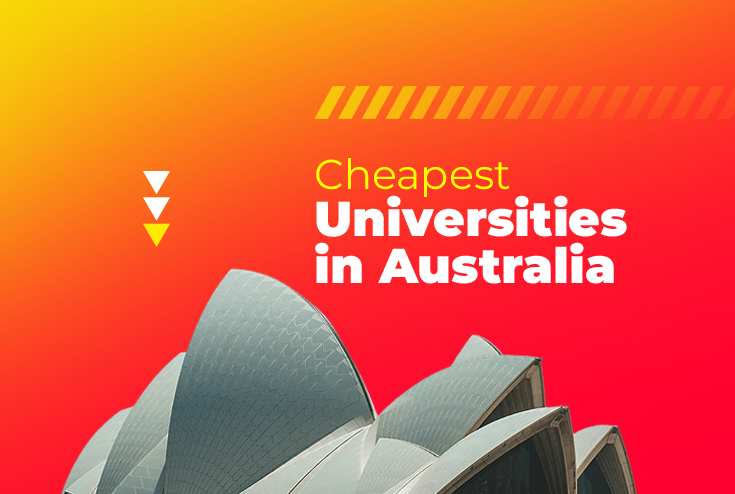
Cheapest Universities in Australia - Guide for Nepali Students
Australia is one of the top study destinations for Nepali students, known for its world-class universities, multicultural environment, and excellent post-study opportunities. However, the cost of education often becomes a major concern. The good news is that studying in Australia doesn’t have to be expensive. With smart planning and the right choice of universities, Nepali students can pursue quality education at affordable tuition rates, especially in 2026 when more institutions are focusing on inclusivity and flexible fee structures.
In this comprehensive guide, we break down the cheapest universities in Australia, their average tuition fees, affordable cities to live in, and scholarship options for Nepali students — so you can make informed decisions and manage your study abroad budget wisely.
Table of Contents
Quick Snapshot: Is Australia Affordable for Nepali Students?
Top 10 Cheapest Universities in Australia for International Students
Cheapest Cities to Study in Australia for International Students
Scholarships & Fee-Reduction Options in Australia for Nepali Students
How to Choose an Affordable University Without Compromising Outcomes
Key Takeaways
Conclusion
FAQs - Cheapest Universities in Australia for International Students
Quick Snapshot: Is Australia Affordable for Nepali Students?
Australia might seem expensive at first glance, but compared to other top destinations like the USA or UK, it offers competitive tuition fees and multiple part-time work options for international students. Regional areas, government support, and university scholarships can make a significant difference in total costs.Typical Tuition Ranges by Degrees
Bachelor’s degrees: AUD 20,000 – 35,000 per year (approx. NPR 18.5 – 32.4 lakhs)
Master’s degrees: AUD 22,000 – 40,000 per year (approx. NPR 20.4 – 37 lakh)
Some regional and public universities offer programs starting from AUD 18,000/year, making them attractive to budget-conscious students.
Average Living Costs
Choosing a university in a regional city can save you thousands of dollars annually and give you extra years on your post-study work visa.
Top 10 Cheapest Universities in Australia for International Students
Finding the right university in Australia that fits your budget is a crucial step for students planning to study abroad. Several public and regional Australian universities are offering internationally recognized degrees at affordable tuition fees, while maintaining excellent teaching quality and strong career outcomes.
Below is a carefully curated list of the Top 10 cheapest universities in Australia for Nepali students, including their locations, popular courses, average tuition fees, and the key reasons why they stand out.
1. University of the Sunshine Coast (UniSC)
Locations:
Sunshine Coast, Moreton Bay, Fraser Coast, Gympie, Caboolture — Queensland
Adelaide - South Australia
Popular Programs: Business, Nursing, IT, Education, Environmental Science
Average Tuition Fees:
Bachelor: AUD 24,000/year
Master: AUD 26,000/year
Reasons to Choose UniSC:
Regional campus benefits with lower living costs
Modern facilities and a strong focus on student experience
Excellent graduate satisfaction rates
Strong industry partnerships for internships and placements
Flexible entry pathways for international learners
2. University of Southern Queensland (UniSQ)
Location: Toowoomba, Springfield, Ipswich — Queensland
Popular Programs: Engineering, Aviation, Business, Health Sciences, IT
Average Tuition Fees:
Bachelor: AUD 22,000/year
Master: AUD 24,000/year
Reasons to Choose UniSQ:
One of Australia’s lowest tuition fee structures for international students
Regional city with significantly cheaper living expenses
Renowned for high student support and online learning options
Strong employability outcomes and industry collaborations
Excellent pathway for regional migration and post-study work benefits
Diverse student community with a growing number of Nepali students
3. Charles Darwin University (CDU)
Location: Darwin, Alice Springs — Northern Territory
Popular Programs: Nursing, IT, Environmental Science, Education, Business
Average Tuition Fees:
Bachelor: AUD 22,000/year
Master: AUD 25,000/year
Reasons to Choose CDU:
Strategic regional location offering extended post-study work rights
Affordable tuition with good scholarship availability
Multicultural campus with a strong Nepali student presence
Research-led programs with industry relevance
High visa acceptance rate for Nepali students
Excellent student-to-staff ratio ensuring personalized support
4. Federation University Australia
Location: Ballarat, Berwick, Gippsland (Victoria), and Brisbane (QLD)
Popular Programs: IT, Business, Engineering, Nursing, Social Work
Average Tuition Fees:
Bachelor: AUD 21,800/year
Master: AUD 25,000/year
Reasons to Choose Federation University:
Consistently ranked among Australia’s most affordable universities
Regional campus incentives and lower living costs
Excellent student support services and flexible entry options
High graduate employability rates in regional areas
Focus on practical learning and internships
Diverse program offerings with growing demand in Australia
5. Southern Cross University (SCU)
Location: Gold Coast, Lismore, Coffs Harbour — New South Wales & Queensland
Popular Programs: Tourism, Education, IT, Environmental Science, Nursing
Average Tuition Fees:
Bachelor: AUD 24,000/year
Master: AUD 26,000/year
Reasons to Choose SCU:
Beautiful regional campuses with lower living costs
Generous scholarships for international students
Small class sizes for personalized attention
High student satisfaction ratings
Work-integrated learning opportunities across multiple sectors
Strategic regional locations for migration and visa advantages
6. University of New England (UNE)
Location: Armidale — New South Wales
Popular Programs: Agriculture, Education, Business, IT, Arts
Average Tuition Fees:
Bachelor: AUD 21,500/year
Master: AUD 24,000/year
Reasons to Choose UNE:
One of the most affordable regional universities in Australia
Low cost of living compared to metropolitan cities
Renowned for distance and blended learning flexibility
Strong academic reputation and teaching quality
Excellent support for international students
Ideal for students seeking longer post-study work rights
7. Central Queensland University (CQU)
Location: Rockhampton, Bundaberg, Brisbane, Melbourne, Sydney
Popular Programs: Engineering, Health, Business, IT, Trade courses
Average Tuition Fees:
Bachelor: AUD 23,000/year
Master: AUD 26,000/year
Reasons to Choose CQU:
Recognized as one of Australia’s most affordable public universities
Multiple campus locations, including regional and metro options
Strong industry connections for internships and jobs
Flexible programs with entry pathways for Nepali students
Regional campuses offer visa and cost benefits
High focus on employability and skill-based education
8. Victoria University (VU)
Location: Melbourne + Regional campuses in Victoria
Popular Programs: Business, IT, Engineering, Health, Hospitality
Average Tuition Fees:
Bachelor: AUD 25,000/year
Master: AUD 28,000/year
Reasons to Choose VU:
Offers Block Model Learning — unique and flexible
Lower tuition fees compared to other Melbourne universities
Strong industry engagement and internship opportunities
Access to a metropolitan lifestyle at an affordable rate
Supportive of international and first-year students
Recognized qualifications with global career relevance
9. Griffith University
Location: Brisbane, Gold Coast, Logan — Queensland
Popular Programs: Hospitality, IT, Business, Health Sciences, Creative Arts
Average Tuition Fees:
Bachelor: AUD 27,000/year
Master: AUD 30,000/year
Reasons to Choose Griffith:
Offers excellent scholarships for high-achieving Nepali students
Regional campuses (e.g., Logan) with lower living expenses
Strong global rankings and research excellence
Diverse program portfolio with practical industry exposure
Excellent student experience and support services
High employability with internship-integrated programs
10. University of Canberra (UC)
Locations:
Canberra - Australian Capital Territory (ACT)
St Leonard’s and Castle Hill - New South Wales (NSW)
Popular Programs: Public Policy, Business, IT, Education, Health
Average Tuition Fees:
Bachelor: AUD 26,000/year
Master: AUD 29,000/year
Reasons to Choose UC:
Affordable tuition compared to other capital city universities
Located in Australia’s capital — excellent policy, business & government exposure
Strong employability focus with internships in the public sector
Recognized for practical, career-oriented programs
Good scholarship opportunities for international students
High graduate success rates in competitive fields
Cheapest Cities to Study in Australia for International Students
Choosing the right city to study in Australia can have as much impact on your overall budget as selecting an affordable university. While big cities like Sydney and Melbourne offer vibrant lifestyles, they also come with high living expenses. Fortunately, Australia has several regional and mid-sized cities that provide quality education, lower rent, affordable transport, and excellent post-study work benefits, making them ideal for international students from Nepal.
These budget-friendly cities offer annual living costs that are up to 30–40% lower than those in major metropolitan hubs, while still providing students with access to reputable universities, part-time job opportunities, and safe, welcoming communities.
Below are some of the best and cheapest cities in Australia for international students in 2026, along with their living costs and unique advantages:
1. Adelaide, South Australia
Known as one of Australia’s most student-friendly and affordable cities, Adelaide combines a high standard of living with low housing and transport costs. It’s home to respected institutions like the University of Adelaide, UniSA, and Flinders University.
Average Living Costs: AUD 18,000 – 22,000/year
Additional Advantages:
Significantly lower rent than Sydney/Melbourne
An efficient and cheap public transport system
Regional classification for post-study work benefits
Safe, multicultural environment with a growing Nepali community
Easy access to internships and jobs in health, education, and hospitality
2. Hobart, Tasmania
Hobart offers an excellent balance between affordability, quality of life, and academic reputation. The University of Tasmania is renowned for its research excellence and relatively low tuition fees compared to mainland institutions.
Average Living Costs: AUD 17,000 – 21,000/year
Additional Advantages:
Lowest rent and food costs among capital cities
Regional city benefits for migration and visa extension
Close-knit student community with supportive services
Surrounded by natural beauty, ideal for a peaceful lifestyle
Access to scholarships and Destination Australia grants
3. Brisbane, Queensland
Brisbane is a major city with lower living costs than Sydney or Melbourne, making it a great choice for students seeking urban opportunities on a budget. It hosts top universities like the University of Queensland and Griffith University.
Average Living Costs: AUD 20,000 – 24,000/year
Additional Advantages:
Cheaper accommodation compared to Sydney
Warm weather year-round — lower heating costs
Strong job market in hospitality, education, and tech
Access to multiple universities and TAFEs
Well-developed transport system and student discounts
4. Gold Coast, Queensland
Famous for its beaches and lifestyle, the Gold Coast is also one of Australia’s most affordable coastal cities for international students, with growing educational infrastructure (e.g., Southern Cross University, Griffith University).
Average Living Costs: AUD 18,000 – 22,000/year
Additional Advantages:
Lower rent than Brisbane and Sydney
Regional city classification for extended post-study work rights
Ideal for tourism, hospitality, and event management jobs
Student-friendly public transport and lifestyle perks
Active international student networks, including Nepali communities
5. Toowoomba, Queensland
A peaceful regional city just 90 minutes from Brisbane, Toowoomba is home to the University of Southern Queensland (UniSQ) and is increasingly popular among Nepali students for its very low cost of living and migration benefits.
Average Living Costs: AUD 16,000 – 20,000/year
Additional Advantages:
Significantly cheaper rent and daily expenses than in metro cities
Access to Destination Australia Scholarships
Longer post-study work visa due to regional status
Strong community support for international students
Ideal for those seeking a quiet, affordable study environment
6. Darwin, Northern Territory
Darwin is one of Australia’s most affordable and migration-friendly cities, home to Charles Darwin University (CDU). It has a tropical climate, a diverse population, and growing job opportunities.
Average Living Costs: AUD 18,000 – 22,000/year
Additional Advantages:
Low living costs compared to other capitals
High demand for skilled workers — strong employability
Extended post-study work rights for graduates
Multicultural environment with growing Nepali presence
Government support for international students
7. Ballarat, Victoria
A regional city near Melbourne, Ballarat is home to Federation University and offers affordable living, a calm environment, and quick access to Melbourne when needed.
Average Living Costs: AUD 17,000 – 21,000/year
Additional Advantages:
Lower accommodation costs than Melbourne
Regional benefits for migration and visa extensions
Short train ride to Melbourne’s job market
Tight-knit student community and safe neighborhoods
Excellent choice for budget-conscious students wanting proximity to a big city
8. Armidale, New South Wales
Armidale is a classic regional student city, home to the University of New England (UNE). It’s well-known for very low living costs, a peaceful lifestyle, and high-quality education.
Average Living Costs: AUD 15,000 – 19,000/year
Additional Advantages:
Among the lowest living costs in Australia
Strong academic reputation of UNE
Regional location = longer post-study work visa
Affordable student accommodation options
Ideal for students focused on studies and savings
Scholarships & Fee-Reduction Options in Australia for Nepali Students
Studying in Australia can be made significantly more affordable through various scholarships, bursaries, and fee-waiver opportunities offered by universities, the Australian Government, and external organizations. For many Nepali students, these scholarships not only reduce tuition fees but also provide financial relief for living costs, making higher education in Australia more attainable. Scholarships are usually awarded based on academic merit, English proficiency, community involvement, or specific fields of study, and some are even tailored exclusively for students from South Asia or Nepal.
University Scholarships
Most Australian universities offer a range of in-house scholarships specifically for international students. These typically cover 10% to 50% of tuition fees, with some high-achieving students eligible for full tuition waivers.
Common types include:
Merit-based scholarships for outstanding academic results.
Regional campus scholarships encourage students to study in affordable regional cities.
International student bursaries are automatically applied during admission.
Vice-Chancellor’s or Dean’s Excellence Awards for top performers.
Faculty-specific scholarships for fields like IT, nursing, engineering, and business.
Example: The University of Southern Queensland offers up to 25% tuition reduction for eligible international students, while Charles Darwin University provides up to 50% scholarships through its Vice-Chancellor’s International High Achievers Award.
Government & External Scholarships
In addition to university funding, Nepali students can also explore Australian Government scholarships and third-party programs, which can fully or partially cover tuition, living allowances, health insurance, and even travel costs.
Notable programs include:
Australia Awards Scholarships – fully funded, prestigious awards focusing on leadership and development for students from Nepal and other partner countries.
Destination Australia Scholarships – offered to students choosing to study in regional Australia, providing up to AUD 15,000 per year.
External scholarships & NGO funding – opportunities from international organizations, Nepali foundations, and professional associations.
Pro Tip: Start your scholarship search early—many awards have strict deadlines and require strong academic records, personal statements, and recommendation letters.
How to Choose an Affordable University Without Compromising Outcomes
Choosing an affordable university in Australia doesn’t mean you have to sacrifice education quality or career opportunities. The key is to focus on value — not just price. Look for institutions that combine low tuition fees, strong graduate outcomes, and recognized accreditations.
Graduate employability: Check universities with strong industry partnerships and high employment rates for international graduates.
Accredited programs: Ensure the courses are recognized by TEQSA (Tertiary Education Quality and Standards Agency) and relevant professional bodies.
Post-study work rights: Regional universities often offer extended Post-Study Work Visas, giving you more time to gain experience.
Internships & work-integrated learning: Prioritize universities that offer practical placements and career support.
Global recognition: Even affordable universities in Australia maintain strong academic standards and are respected worldwide.
Don’t just compare tuition fees; factor in living costs, scholarship options, and long-term ROI when making your decision.
Key Takeaways
Australia offers affordable study options for Nepali students through low-cost universities, regional campuses, and generous scholarships.
Tuition fees and living costs vary widely by degree level and location—regional cities are generally cheaper than major metros like Sydney and Melbourne.
Top affordable universities provide globally recognized degrees, practical learning opportunities, and strong graduate outcomes.
Scholarships and government funding can significantly reduce overall expenses, especially for academically strong students.
Choosing the right university involves balancing affordability, program quality, employment outcomes, and post-study visa opportunities.
With smart planning and the right guidance, studying in Australia can be both affordable and rewarding for Nepali students.
Conclusion
Studying in Australia doesn’t have to be expensive — with the right planning, university selection, and scholarship opportunities, Nepali students can access world-class education at an affordable cost. From low-tuition universities and budget-friendly cities to generous financial aid programs, there are plenty of smart ways to make your Australian study dream a reality.
Whether you’re aiming for a Bachelor’s or Master’s degree, choosing the right university is the first step toward building a successful global career. But navigating application procedures, scholarships, and visa processes can be challenging without expert help.
Maple International Education is here to guide you through every step — from shortlisting the cheapest universities in Australia to helping you secure scholarships and prepare for your visa.
Contact us today for a free consultation and turn your Australian study goals into reality.
FAQs - Cheapest Universities in Australia for International Students
1. Are there any free universities in Australia?
No, Australia doesn’t have fully free universities for international students. However, scholarships, bursaries, and government programs like Australia Awards and Destination Australia can cover partial or full tuition, making education highly affordable.
2. Which course is the cheapest in Australia?
Generally, Humanities, Education, and Arts programs have lower tuition fees compared to Medicine, Engineering, or Business. Diploma and TAFE courses are also cheaper alternatives, often costing between AUD 9,000–15,000 per year, depending on the institution.
3. How much does it cost to study in Australia as an international student?
On average, international students spend:
Bachelor’s degree: AUD 20,000–35,000 per year
Master’s degree: AUD 22,000–38,000 per year
Living costs: AUD 15,000–22,000 per year, depending on the city
Studying in regional cities and applying for scholarships can significantly reduce overall costs.
4. Which university in Australia has a 100% acceptance rate?
While no university officially has a 100% acceptance rate, regional and public universities such as the University of Southern Queensland and Charles Sturt University are known for their high acceptance rates and flexible entry pathways for international students.
5. Which university gives admission easily in Australia?
Universities with flexible admission criteria, lower minimum academic scores, and strong support for international students tend to have easier admission processes. Examples include:
Charles Darwin University
University of New England
Federation University Australia
These institutions focus on inclusivity while maintaining academic quality.
6. What is the easiest university in Australia to get into?
The easiest universities are typically regional or public institutions with lower competition and more entry pathway programs (e.g., foundation or diploma-to-degree). Federation University and Charles Sturt University are popular among Nepali students for their affordable fees and straightforward admission processes.
Also Read:
Cost to Study in Australia from Nepal in 2025: A Guide
Scholarships in Australia for Nepalese Students
Part-Time Jobs in Australia for Nepali Students in 2026
Best Cities in Australia for International Students




